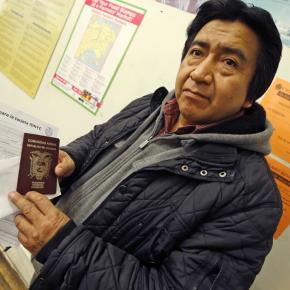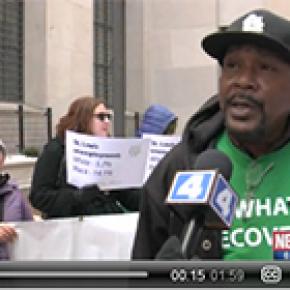Unpredictable Work Schedules: As Companies Shave Costs With Just-In-Time Scheduling, Workers, Regulators Fight Back
Unpredictable Work Schedules: As Companies Shave Costs With Just-In-Time Scheduling, Workers, Regulators Fight Back
Brianna Roy-Rankin, 23, is just the kind of worker Target would like to retain and promote. She says she loved her job...
Brianna Roy-Rankin, 23, is just the kind of worker Target would like to retain and promote. She says she loved her job at the retailer's store in Champaign, Illinois. She had great bosses, got along well with her co-workers and enjoyed the employee discounts. But last week, after two years as a sales associate, Roy-Rankin quit her job.
“I couldn’t really plan. I was at the mercy of the scheduling system,” she says. “Otherwise, I honestly, probably, would’ve stayed.”
Roy-Rankin went to college nearby, at the University of Illinois. Before she graduated in May, she says it was a constant challenge to balance her studies and social life with her part-time job -- usually around 20 hours a week at just under $10 an hour.
Target has an unforgiving scheduling system. Roy-Rankin says she would have to submit requests to take time off for spring break or visit her parents weeks, if not months in advance -- otherwise she’d be slotted to work without recourse. She would learn about her weekly work schedule three weeks in advance, which wasn’t too bad. But then her hours would fluctuate drastically. One week, she’d be scheduled for a 8 a.m.-to-noon shift on a particular day; the next, it might be a 5 p.m.-to-11 p.m. closing shift. Eventually, it became too much to juggle.
Roy-Rankin's situation is hardly unique.
A Common Trend
Nearly three in 10 hourly workers in the United States say they rarely get consistent work schedules, according to a study released Tuesday by WorkJam, a firm that specializes in workforce scheduling technology.
What’s more, an astounding 56 percent say they get their schedules a week or less in advance. Both trends run rampant in the fast-growing service sector, especially in low-wage fields like retail and fast food. And while policies of this sort save companies money by allowing them to tailor schedules to an expected flow of customer traffic, workers say it's the source of headaches.
Joshua Ostrega, chief operating officer and co-founder of WorkJam, admits the 56 percent figure came as a bit of a shock. “I think it’s extremely high,” he says. “We were actually quite surprised.”
Workers Employed in the Retail Trade Industries (Seasonally Adjusted) | FindTheData
An especially harsh practice among retailers is what’s known as just-in-time or on-call scheduling. Under this system, workers are required to be “on call” to come in and work on a particular day even if they’re not scheduled to do so.
The industry’s profit margins are tight, says Ostrega, and companies are looking to extract savings however they can. Software-based scheduling systems do the trick by linking labor supply to consumer demand. When store traffic is low, the system calls for fewer employees; when the system projects more patrons, it demands more workers. Employers like it because it keeps them from racking up unnecessary labor costs.
Now, unpredictable scheduling is increasingly drawing the interest of public authorities.
'The Pressure's Mounting'
In April, New York Attorney General Eric Schneiderman sent letters to major retailers that inquired about their on-call scheduling and asked whether their policies violated state law. Like seven other states and the District of Columbia, New York has so-called reporting-time laws that require employees to be paid when they report to work, even if no work is provided.
Since the letters went out, a number of high-profile companies have announced changes to their policies. The Gap and Abercrombie & Fitch, which both received the notices, said they would end the practice of on-call scheduling. And Starbucks promised last year to provide more consistent scheduling to baristas. But as a recent story in the New York Times revealed, the cafe chain has failed to do so.
Robert Hiltonsmith, senior policy analyst at Demos, a progressive think tank, expects the positive trends to continue -- even if Tuesday’s survey suggests employers overall aren’t relenting on tough and irregular scheduling demands. “I think it’s a slow burn, but the pressure’s mounting,” he says.
It’s in part a question of economic self-interest, Hiltonsmith says. Burned-out workers tend to quit their jobs fairly quickly, and high turnover is expensive. That’s one of the reasons why Walmart, the nation’s largest private-sector employer, and its top competitors voluntarily hiked wages earlier this year, according to Hiltonsmith. In fact, when Walmart announced it was boosting starting pay to at least $9 an hour, it also promised to notify workers of their schedules at least two and a half weeks in advance.
Reforms like this and others -- shifts that are scheduled the same time every week -- could prevent retailers from losing employees like Roy-Rankin, the kind of people who are otherwise content at work.
There’s also mounting political pressure, which stems from growing public concern over the livelihood of service-sector workers. Hiltonsmith attributes this to the “seismic shifts in the labor force” -- the decades-long decline of manufacturing and growth in service-sector employment.
Contrary to the popular image, retail workers are not teenagers looking to make a quick buck. The median age of a retail trade employee is 38, according to the federal Bureau of Labor Statistics.
“I think people had less concern when it wasn’t people trying to support their families,” Hiltonsmith says. “For better or worse, the service economy is the economy of the country’s future.”
Source: International Business Times
A Job Guarantee and the Federal Reserve Board
The idea that the government would commit itself to act as an employer of last resort and guarantee a job to everyone...
The idea that the government would commit itself to act as an employer of last resort and guarantee a job to everyone has been getting more attention in recent months. While many on the left have long pushed this position, the Clinton-linked Center for American Progress (CAP) recently embraced the idea in a conference last week. It is good to see ideas outside of the mainstream getting attention, but there are a couple of issues worth keeping in mind to ensure that the effort does not end up being counterproductive.
The first is to recognize that a job guarantee is a huge lift, not only politically but in its implementation. In effect the guarantee is not only going to be providing jobs to workers who do not currently have one, but it will also end up offering a potentially more attractive alternative to millions of people now in low-wage jobs. How attractive the alternative is will of course depend on the wage offered in the government supported jobs.
Read the full article here.
Promueven petición contra Wells Fargo y JPMorgan por “financiar el dolor” de inmigrantes

Promueven petición contra Wells Fargo y JPMorgan por “financiar el dolor” de inmigrantes
La petición cuenta con el respaldo de más de 70 organizaciones bajo el paraguas de la coalición #FamiliesBelongTogether...
La petición cuenta con el respaldo de más de 70 organizaciones bajo el paraguas de la coalición #FamiliesBelongTogether, que incluye a Presente.org, la Unión de Libertades Civiles de EEUU (ACLU), MoveOn.org, Amnistía Internacional, la Alianza Nacional de Trabajadoras Domésticas, MomsRising, Center for Popular Democracy, y Make the Road New York, entre otras.
Lea el artículo completo aquí.
Lingo still a barrier to relief
Times Union – August 7, 2013, by Jimmy Vielkind - Immigrant advocacy groups say it remains difficult to get access to...
Times Union – August 7, 2013, by Jimmy Vielkind - Immigrant advocacy groups say it remains difficult to get access to government services in languages other than English — nearly two years after Gov. Andrew Cuomo decreed that written and oral interpretation would be available the state’s six most-spoken foreign languages.
Cuomo signed an executive order that took effect last October mandating state officials to offer language assistance for speakers of Spanish, French, Italian, French Creole, Russian and Chinese. But the order’s scope was necessarily limited to state agencies, even though state-funded services like food stamps, driver’s licenses and unemployment benefits are administered by New York City or other counties.
The groups — including Make the Road New York, the Center for Popular Democracy and the Center for the Elimination of Minority Health Disparities at the University at Albany — visited government offices and surveyed people with limited English proficiency to develop a measure of compliance. In a report released earlier this week, they found that less than half the people who needed language assistance were able to receive it.
According to Nisha Agarwal, deputy director of the Center for Popular Democracy, the survey found 63 percent of citizens using state-operated facilities that are explicitly covered by the order were not successful in their quest to gain language assistance.
“The governor’s team has been very engaged on implementation, and we’re sympathetic to the challenges of getting an entire state apparatus to change,” said Agarwal. “That said, the results are by no means satisfactory, and we were quite disappointed that the state took the position that county-run agencies for state services were not within the ambit of the order. We feel it’s a pretty big gap.”
The Cuomo administration responded by saying that all covered state agencies are in compliance with this executive order
“This report paints an inaccurate picture of reality by relying on visits to county-run agencies that by law fall outside the executive order,” said Cuomo spokesman Richard Azzopardi. “Everyone should have the same access to their government, and we encourage counties to follow the state’s lead.”
Source
How Municipal ID Cards Make Cities More Inclusive
This week Newark, New Jersey, ...
This week Newark, New Jersey, became the latest in a growing number of cities to adopt a municipal ID program. The IDs, available to all residents 14 and older, will be especially useful to undocumented immigrants, the homeless, formerly incarcerated people, and other populations who may not be able to present documents typically required for state-issued cards.
One notable addition to this list: transgender people. Unlike other forms of state and federal identification, Newark’s new card will not list the holder’s gender. The omission is expected to benefit those who do not identify with the gender listed on their birth certificate or other official documents.
Gender sensitivity is a relatively new development within the relatively newphenomenon of municipal IDs. In 2007, New Haven, Connecticut, became the first city in the U.S. to offer city IDs, followed by several cities in California (including San Francisco and Los Angeles), Washington, D.C., New York City, and a few others. In every case, undocumented immigrants were the main target group for the cards. But when San Francisco launched its ID program in 2007, the city made a point of omitting a gender marker (“male” or “female”) from the card, and in 2014 New York City became the first jurisdiction to allow local ID card holders to self-designate their gender.
Michael Silverman, executive director of the Transgender Legal Defense & Education Fund, hopes that more cities will embrace self-designation on municipal IDs. “Since transgender people face so much discrimination based on sex, it’s important that they have ID that matches who they truly are and how they appear to the outside world,” he says. It’s a human rights issue, since IDs confer access to virtually every aspect of public life. When applying for jobs, public benefits, or other services that require identification, the option to affirm one’s gender identity (or omit it) can be significant. Sometimes, Silverman says, ID is the “only layer of support” for a person’s gender identity.
Gender markers are just one battleground in the struggle for gender-flexible documentation, however. Most states don’t allow people to change the gender on their birth certificates unless they undergo sex-reassignment surgery—difficult-to-define procedures that many transgender people either do not want or cannot afford. TLDEF has represented transgender people in West Virginiaand South Carolina who were asked to remove wigs, makeup, and other items associated with female gender expression before taking their driver’s license photos, and the ACLU recently sued the state of Michigan for requiring proof of reassignment surgery to change gender markers on state IDs.
But Silverman senses a sea change in public attitudes on gender identity, buoyed by the high-profile stories of Laverne Cox and Caitlyn Jenner. In Newark, New York, and San Francisco, gender identity has become part of the conversation surrounding municipal IDs—one that has so far focused on the legal rights of undocumented immigrants. Silverman predicts that, moving forward, “municipalities will look to what other similar cities have done, and will take the concerns of the local transgender population into account when they plan these types of programs.”
In a 2013 report on municipal ID programs across the U.S., the Center for Popular Democracy wrote that “cities that offer ID to their residents regardless of immigration status are making a powerful statement of welcome and inclusion.” The same goes for cities who do so regardless of gender identity.
Source: The Atlantic's CityLab
Workers' next big fight: Fairer scheduling
The Fight for $15 is still being waged, but the movement is adding "Fight for a Fair Workweek" to its agenda. Americans...
The Fight for $15 is still being waged, but the movement is adding "Fight for a Fair Workweek" to its agenda.
Americans at the lowest rung of the wage ladder are looking forward to hourly pay hikes in cities and states including New York and California. Yet there's a troubling and escalating trend of underemployment and scheduling hurdles that make it next to impossible for many workers to get ahead, worker advocates say.
A defining feature of the post-recession recovery has been a surge in part-time workers. And despite an improving labor market, with unemployment at 5 percent, more than 6 million people in the U.S. who would rather work full-time remain stuck in part-time jobs.
California represents a large chunk of that underemployment, with more than 1 million working involuntary part-time jobs. In Silicon Valley, more than four out of every 10 hourly workers are now part-time, according to research due to be released Thursday.
The findings, based on data compiled by the Bureau of Labor Statistics and written by the Center for Popular Democracy and Working Partnerships USA, found insufficient and inconsistent hours leave hourly workers struggling in San Jose, where the minimum hourly rate currently stands at $10.30.
Of San Jose's total workforce, 47 percent, or an estimated 162,000, work hourly jobs, with 43 percent of those hourly workers employed part-time or on variable schedules as their main job, up from 26 percent a decade earlier, according to the report.
"Employers have restructured employment so that the work week is shrinking for low-wage workers," Carrie Gleason, director of the Center for Popular Democracy's Fair Workweek Initiative. "The minimum wage is finally catching up, and now we're going to see more and more policymakers pay attention to hours. They recognize $15 isn't enough if you're only working part-time."
What's occurring in San Jose helps relay "an important national story about a very prosperous region with a very low unemployment rate, yet one out of three workers isn't making it every month," said Derecka Mehrens, executive director at Working Partnerships USA. "From what we've seen, the wage fight cannot be separated from the hour fight."
Mehrens' group is gathering signatures to put an initiative on the November ballot that would require employers in San Jose offer more hours to existing qualified part-time workers before hiring new part-time or temporary workers.
Opponents to scheduling mandates include the National Restaurant Association, or NRA, which has lobbied against measures under consideration in state and local legislatures, as well as one proposed in Congress. The trade association says such measures have already caused "confusion" for restaurant owners in San Francisco and could result in fewer workers being hired.
Advocates for workers have a more sympathetic ear, if not a solution, at Starbucks (SBUX), which has drawn its share of negative attention for creating havoc with the lives of its baristas through its scheduling practices. At the company's annual meeting in Seattle last month, barista Darrion Sjoquist asked CEO Howard Schultz about addressing the scheduling issues that he and his colleagues routinely face.
"It's at the top of our list to create some balance between the pressure that exists on some people who are having a difficult time with the schedule and our ability to schedule thousands of people," said Schultz. "We understand the issues and we think they are critical," he said, adding that Starbucks believes a technological tool is needed to address the issues involved with scheduling 300,000 people around the world.
The scheduling issue last week had attorneys general from California, Connecticut, the District of Columbia, Illinois, Maryland, Massachusetts, Minnesota, New York and Rhode Island expanding a probe into the use of unpaid on-call shifts and other scheduling practices in the retail industry.
"On-call shifts are unfair to workers who must keep the day free, arrange for child care, and give up the chance to get another job or attend a class -- often all for nothing," New York Attorney General Eric Schneiderman said in a statement. "On-call shifts are not a business necessity, as we see from the many retailers that no longer use this unjust method of scheduling work hours."
American Eagle Outfitters (AEO), Uniqlo, Aéropostale (ARO), Payless ShoeSource (PSS), Coach (COH), and the Disney Store (DIS) are among the 15 retailers sent letters asking about their use of on-call shifts, which can involve mandating workers to be available for work without a guaranteed shift. The practice is a potential violation of state reporting pay laws, which require employers give workers minimum pay when a shift is canceled or shortened.
Maryland, Minnesota and Illinois don't have reporting pay laws, but they've signed onto the letters to express concern about the impact of on-calling scheduling on workers and their families.
The inquiry follows a similar one by Schneiderman last year that resulted in six brands including the Gap (GPS), Victoria's Secret (LB) and Abercrombie & Fitch (ANF) ending on-call scheduling, a move impacting a quarter million workers.
Scheduling protections were adopted last year in San Francisco and Santa Clara County, while conversely, Indiana and Alabama are among the states that have preemptively passed legislation prohibiting cities within their borders from enacting such measures.
In Seattle, which has passed paid sick-time standards and a higher minimum wage, the city council is considering legislation that would require companies offer workers more livable schedules.
By KATE GIBSON
Source
Second Draft of Scaffold Report Released
Times Union - September 3, 2014, by Casey Seiler - SUNY's Nelson A. Rockefeller Institute of Government has released a...
Times Union - September 3, 2014, by Casey Seiler - SUNY's Nelson A. Rockefeller Institute of Government has released a second draft of its controversial report on New York's Scaffold Law. According to the Institute's Deputy Director for Operations Robert Bullock, it's the only remaining version of the report that was shared with the report's funder, the state Lawsuit Reform Alliance.
The business-backed group, which opposes Scaffold Law, paid $82,800 to fund the report — sponsorship that has led critics to attack the study as advocacy in the guise of research. Its authors, however, insist the research was conducted in good faith.
Scaffold Law, which places "absolute liability" on employers for gravity-related workplace injuries, is supported by labor unions but opposed by business groups that claim it needlessly drives up construction costs — a thesis backed up in part by the report. Opponents would like to see New York follow other states by adopting a "comparative negligence" standard that would make workers proportionately responsible when their actions contribute to an accident.
The Center for Popular Democracy, a labor-backed group that supports Scaffold Law, lambasted the report upon its release last winter and requested copies of all communications between the institute and the Lawsuit Reform Alliance. That FOIL request produced a series of emails between researchers and LRA Executive Director Tom Stebbins, including Stebbins' suggested edits to a June 25, 2013, draft copy of the report that was not initially released by the institute.
The center appealed to SUNY, which ultimately released the June 25 draft. A comparison of the draft and the final report suggested that some of Stebbins' suggestions were reflected in the final version. Researchers, however, said any changes were the result of their efforts to sharpen their analysis, and not made due to pressure from the funder.
The newly released draft, dated Aug. 7, 2013, closely resembles the final report.
The center's Josie Duffy claims the six-week gap between the first and second drafts suggests that the institute moved quickly to follow the alliance's edits.
"SUNY says it has now disclosed everything it has, but given that LRANY and the authors held weekly conference calls to discuss the report's progress, we may never know the full extent of their influence over the final version," she said.
In an email, Bullock said the institute "has been open and honest about its contacts with funders and its research has been and will continue to be immune from influence."
"It is unfortunate," he added, "that a research organization known throughout the nation for the quality and character of its work should have to defend itself from accusations leveled by the Center for Popular Democracy, an organization well known for its partisanship."
Source
Fed Up Statement: Market Turmoil Should Remind Fed that Economy Is Too Weak to Slow It Down
Shawn Sebastian, Policy Analyst at the Center for Popular Democracy, released the following statement on behalf of the...
Shawn Sebastian, Policy Analyst at the Center for Popular Democracy, released the following statement on behalf of the Fed Up campaign:
“The Fed Up campaign has been saying for more than a year that the economy is too weak to warrant interest rate hikes. Although the stock market was performing well and Wall Street was reaping major profits, the real economy has seen stagnant wages and insufficient job growth.
“The past week’s events vindicate our argument. The economy is too weak, and the performance of the stock market is not a legitimate basis for making interest rate decisions. Just as the market inflated itself over previous months, and witnessed a “correction” recently, it will likely continue to fluctuate in the months ahead. Fed officials who pointed to an inflated stock market as a justification to raise interest rates have been proven wrong: the health of the economy should be measured by the labor market, not the stock market, and the labor market is far from recovered.
“The Fed must continue focusing on the fundamentals: building a labor market that works for all communities, and that features rising wages and good jobs for everybody who wants to work. Creating genuine full employment is the Fed’s mandate, and the past few days vindicate the message that the Fed Up campaign’s worker leaders and economists have said all along: this economy is far too weak for the Fed to intentionally slow it down.”
###
The Center for Popular Democracy promotes equity, opportunity, and a dynamic democracy in partnership with innovative base-building organizations, organizing networks and alliances, and progressive unions across the country. CPD builds the strength and capacity of democratic organizations to envision and advance a pro-worker, pro-immigrant, racial justice agenda.
Downtown Protest Held Over Racial Disparity in Employment
KMOV St. Louis - March 5, 2015, by Steve Savard - About 12 people rallied outside the Federal Reserve Bank of St. Louis...
KMOV St. Louis - March 5, 2015, by Steve Savard - About 12 people rallied outside the Federal Reserve Bank of St. Louis Thursday to protest the racial disparity in employment in the St. Louis region.
White unemployment in the St. Louis area is 5.7 percent, African American unemployment is 14.1 percent. Organizers said they want the Fed to adopt policies focused on getting more people get back to work.
“It’s not easy getting a job, when you are qualified even when you look the part,” one demonstrator said.
Organizers said the story of one attendee demonstrates the problem.
“When you do get the job, it’s something to get you buy, but it’s not a livable wage,” Ray Rounds said.
Rounds said he left a low paying job to go back to school at the Green Technology Training Program at St. Louis University.
“I’m certified in lead remediation, mold, asbestos, permit required confined spaces, hazardous material. I’ve got 17 of those certificates I was really proud of and I was ready to go to work,” Rounds said.
Rounds said he has not been able to land a job in the two years since he finished school.
“It’s pretty frustrating because with all I thought that I had accomplished. It’s meaningless because there are no jobs,” Rounds said.
Rounds has been attending rallies, working with churches and other organizations to try and make a difference. He hopes the contacts he has made will help him land a job.
Demonstrators also said they want to see more diversity on the Federal Reserve Board.
Source
Man with Lou Gehrig’s disease makes emotional plea to Jeff Flake to vote down Trump’s tax plan

Man with Lou Gehrig’s disease makes emotional plea to Jeff Flake to vote down Trump’s tax plan
One of Sen. Jeff Flake (R-AZ)’s last major votes before retirement could be a death sentence for tens of thousands of...
One of Sen. Jeff Flake (R-AZ)’s last major votes before retirement could be a death sentence for tens of thousands of Americans. One of them is Ady Barkan, a 33-year-old California father living with amyotrophic lateral sclerosis (ALS), who, during a Thursday night flight from Washington D.C. to Phoenix, Arizona, asked Flake to cast a vote to save his life.
“I was healthy a year ago. I was running on the beach,” Barkan told Flake on the flight, according to video footage of the exchange. “I’m 33, I have an 18-month-old son, and out of nowhere I was diagnosed with ALS, which has a life expectancy of three to four years, no treatment, no cure.”
Read the full article here.












8 days ago
8 days ago